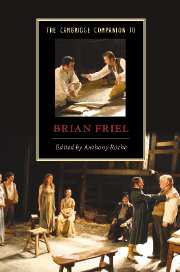Book contents
- Frontmatter
- 1 Introduction
- 2 The early plays
- 3 Surviving the 1960s: three plays by Brian Friel 1968-1971
- 4 Friel and the Northern Ireland “Troubles” play
- 5 Family affairs: Friel’s plays of the late 1970s
- 6 Five ways of looking at Faith Healer
- 7 Translations, the Field Day debate and the re-imagining of Irish identity
- 8 Dancing at Lughnasaand the unfinished revolution
- 9 The late plays
- 10 Friel’s Irish Russia
- 11 Friel and performance history
- 12 Friel’s dramaturgy: the visual dimension
- 13 Performativity, unruly bodies and gender in Brian Friel’s drama
- 14 Brian Friel as postcolonial playwright
- Bibliography
- Index
5 - Family affairs: Friel’s plays of the late 1970s
Published online by Cambridge University Press: 28 January 2007
- Frontmatter
- 1 Introduction
- 2 The early plays
- 3 Surviving the 1960s: three plays by Brian Friel 1968-1971
- 4 Friel and the Northern Ireland “Troubles” play
- 5 Family affairs: Friel’s plays of the late 1970s
- 6 Five ways of looking at Faith Healer
- 7 Translations, the Field Day debate and the re-imagining of Irish identity
- 8 Dancing at Lughnasaand the unfinished revolution
- 9 The late plays
- 10 Friel’s Irish Russia
- 11 Friel and performance history
- 12 Friel’s dramaturgy: the visual dimension
- 13 Performativity, unruly bodies and gender in Brian Friel’s drama
- 14 Brian Friel as postcolonial playwright
- Bibliography
- Index
Summary
In The Freedom of the City (1975) and Volunteers (1977) Brian Friel closely engaged with key political developments in Northern Ireland in the early 1970s (Bloody Sunday, internment). The two plays I wish to examine in this chapter - 1977's Living Quarters and 1979's Aristocrats - show a complex repositioning. On the one hand, there is a distancing and a greater mediation in terms of direct representation of the politics of Ireland north and south. This is primarily achieved through a more studied deployment of the language of world culture - such as the music of Chopin, which is so central to the dramaturgy of Aristocrats - and in particular an engagement with a number of classic playwrights from the world repertoire.
Living Quarters is acknowledged as being “after Hippolytus,” and in dramatizing an Irish version of Phaedra it also brings Racine to mind. The play has eight characters in search of an author-director in ways which recall Pirandello, as well. None of this is new in Friel. The music of Wagner provided an important emotional and structural resource in The Loves of Cass McGuire (1966) and Pirandello was also crucial to its self-conscious theatricality. What is new is the increased dramatic and emotional sophistication of how these materials are handled. This may in part derive from the presence of Chekhov, who is going to feature so prominently in Friel's career from here on. Friel was working at the time on a translation of Three Sisters, which was to be staged in 1981 by Field Day. The presence of three sisters in the households of Living Quarters and Aristocrats marks them as no less versions of Chekhov's plays, fully transplanted from a Russian historical setting to a (then) contemporary Ireland. But if these plays see a more international Friel emerging in his drama, they are no less a return to origins, a going home.
- Type
- Chapter
- Information
- The Cambridge Companion to Brian Friel , pp. 41 - 52Publisher: Cambridge University PressPrint publication year: 2006

